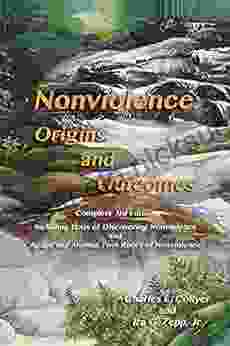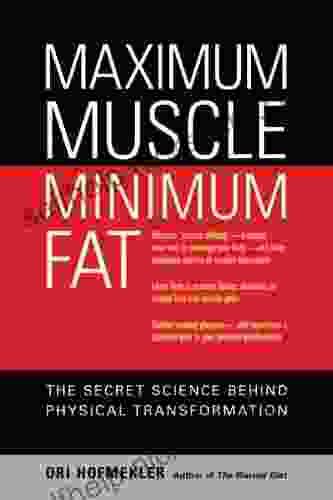Nonviolence: Origins and Outcomes

Nonviolence, as a philosophy and a strategy, has its roots in various traditions and has been employed throughout history by individuals and movements seeking to bring about social and political change. This article explores the origins of nonviolence, its key principles, different nonviolent strategies, and some of its notable outcomes.
Origins of Nonviolence
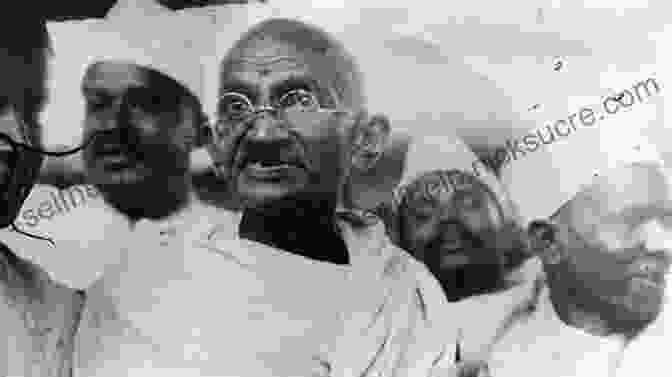
5 out of 5
| Language | : | English |
| File size | : | 3969 KB |
| Text-to-Speech | : | Enabled |
| Screen Reader | : | Supported |
| Enhanced typesetting | : | Enabled |
| Word Wise | : | Enabled |
| Print length | : | 234 pages |
The concept of nonviolence, or ahimsa, has ancient origins in Eastern philosophies such as Hinduism, Buddhism, Jainism, and Taoism. These traditions emphasize the interconnectedness of all living beings and the belief that violence is inherently harmful and ultimately counterproductive.
In the West, nonviolence was influenced by Christian teachings, particularly the Sermon on the Mount, which advocates for love, forgiveness, and turning the other cheek. The Quaker movement, which emerged in the 17th century, played a significant role in developing and promoting nonviolent principles.
Key Principles of Nonviolence
Nonviolence is guided by several fundamental principles:
* Non-harm: Nonviolence rejects violence as a means to achieve ends. It emphasizes respect for the inherent dignity of all individuals. * Truth: Nonviolence is based on the belief that truth and justice are ultimately more powerful than violence. * Courage: Nonviolence requires courage and determination in the face of adversity. It involves standing up for what is right, even when it is difficult. * Love: Nonviolence is rooted in love and compassion for all beings. It seeks to transform conflict through empathy and understanding. * Unity: Nonviolence emphasizes the importance of building unity and solidarity among those seeking change.
Nonviolent Strategies
Nonviolent strategies vary depending on the context and the goals of the movement. However, some common approaches include:
* Civil disobedience: Deliberately breaking unjust laws to highlight their flaws and provoke change. * Boycotts: Refusing to buy or use products or services from companies or governments that engage in harmful practices. * Nonviolent communication: Using respectful and collaborative language to resolve conflicts and build relationships. * Mass demonstrations: Gathering large numbers of people to peacefully protest against injustice or demand change. * Fasting and other forms of nonviolent pressure: Using self-sacrifice and symbolic gestures to draw attention to a cause or pressure decision-makers.
Notable Outcomes of Nonviolence
Nonviolence has been a powerful force for change throughout history. Some notable outcomes of nonviolent movements include:
* Indian Independence Movement: Led by Mahatma Gandhi, the Indian independence movement used nonviolent resistance to successfully challenge British colonial rule in India. * American Civil Rights Movement: Martin Luther King Jr. and other leaders of the American Civil Rights Movement employed nonviolent tactics to fight for racial equality and justice in the United States. * Solidarity Movement in Poland: The Solidarity movement, led by Lech Walesa, used nonviolent strikes and demonstrations to challenge the communist government in Poland and ultimately bring about democratic reforms. * Velvet Revolution in Czechoslovakia: The Velvet Revolution in Czechoslovakia in 1989 involved large-scale nonviolent protests that led to the overthrow of the communist regime. * Arab Spring: Nonviolent uprisings played a significant role in the Arab Spring, a series of protests and revolutions that swept through the Middle East and North Africa in 2011.
Nonviolence is a powerful and effective philosophy and strategy for social and political change. Rooted in ancient traditions and guided by key principles, nonviolence emphasizes non-harm, truth, courage, love, and unity. Through various nonviolent strategies, such as civil disobedience, boycotts, and mass demonstrations, nonviolent movements have achieved significant outcomes, including the overthrow of oppressive regimes, the advancement of social justice, and the promotion of peace and reconciliation.
5 out of 5
| Language | : | English |
| File size | : | 3969 KB |
| Text-to-Speech | : | Enabled |
| Screen Reader | : | Supported |
| Enhanced typesetting | : | Enabled |
| Word Wise | : | Enabled |
| Print length | : | 234 pages |
Do you want to contribute by writing guest posts on this blog?
Please contact us and send us a resume of previous articles that you have written.
 Fiction
Fiction Non Fiction
Non Fiction Romance
Romance Mystery
Mystery Thriller
Thriller SciFi
SciFi Fantasy
Fantasy Horror
Horror Biography
Biography Selfhelp
Selfhelp Business
Business History
History Classics
Classics Poetry
Poetry Childrens
Childrens Young Adult
Young Adult Educational
Educational Cooking
Cooking Travel
Travel Lifestyle
Lifestyle Spirituality
Spirituality Health
Health Fitness
Fitness Technology
Technology Science
Science Arts
Arts Crafts
Crafts DIY
DIY Gardening
Gardening Petcare
Petcare John Austin
John Austin Justine Kerfoot
Justine Kerfoot Moon Travel Guides
Moon Travel Guides Mike Eruzione
Mike Eruzione Patrick Hamill
Patrick Hamill Conrad Goeringer
Conrad Goeringer Dr Jerisa Berry
Dr Jerisa Berry Deanna Pecaski Mclennan
Deanna Pecaski Mclennan Rufus Stephens
Rufus Stephens Laurie Kennedy Malone
Laurie Kennedy Malone Austin Ruse
Austin Ruse James Ladyman
James Ladyman Steve Oakes
Steve Oakes Lizzie Lane
Lizzie Lane Steven Brill
Steven Brill Karen Berger
Karen Berger Larry Olmsted
Larry Olmsted Carolyn Wyman
Carolyn Wyman Kevin Kelly
Kevin Kelly Lilith Dorsey
Lilith Dorsey Charles D Garvin
Charles D Garvin Elizabeth M Ward
Elizabeth M Ward Tracey L Moore
Tracey L Moore Linda Wong
Linda Wong John Littleford
John Littleford Fred Alan Wolf
Fred Alan Wolf Roy Benaroch Md
Roy Benaroch Md Karen Whitley Bell
Karen Whitley Bell Matt Wallaert
Matt Wallaert Sam Quek
Sam Quek Mark Baker
Mark Baker Ernestine Gilbreth Carey
Ernestine Gilbreth Carey Ken Phillips
Ken Phillips Carol Ann Rinzler
Carol Ann Rinzler Robert Chuckrow
Robert Chuckrow Lawrence A Kane
Lawrence A Kane Samantha Bongeka Nqoko
Samantha Bongeka Nqoko Pedro G Ferreira
Pedro G Ferreira Tim Muehlhoff
Tim Muehlhoff Debora Rasio
Debora Rasio J A Baker
J A Baker Maureen Connolly
Maureen Connolly Sarah Boslaugh
Sarah Boslaugh Jessica Nabongo
Jessica Nabongo Esther M Toddler
Esther M Toddler Inga Aksamit
Inga Aksamit Peter Levin
Peter Levin Proprietary Edition Kindle Edition
Proprietary Edition Kindle Edition Samir Okasha
Samir Okasha Vivian Sandau
Vivian Sandau Lara Lillibridge
Lara Lillibridge Print Replica Kindle Edition
Print Replica Kindle Edition Brooke Dojny
Brooke Dojny Terry Marsh
Terry Marsh E W Bullinger
E W Bullinger Jeffrey Freed
Jeffrey Freed Darryl Cunningham
Darryl Cunningham Jim Fay
Jim Fay Ben Riggs
Ben Riggs Ashley Rhodes Courter
Ashley Rhodes Courter Sara Zarr
Sara Zarr Lisa Gache
Lisa Gache Robert M Steward
Robert M Steward Levison Wood
Levison Wood Beatrice Bruteau
Beatrice Bruteau Sanya Richards Ross
Sanya Richards Ross Gabriel Gambetta
Gabriel Gambetta Kjell Erik Rudestam
Kjell Erik Rudestam Vance Packard
Vance Packard Rachel Mitchell
Rachel Mitchell Deborah Hughes Hallett
Deborah Hughes Hallett Mohamed F El Hewie
Mohamed F El Hewie Tony Nester
Tony Nester Nina W Brown
Nina W Brown Bill Thorness
Bill Thorness Sofia Price
Sofia Price Richard Strozzi Heckler
Richard Strozzi Heckler Augustus M Walton
Augustus M Walton Deborah Falaye
Deborah Falaye Daffodil Campbell
Daffodil Campbell Izabelle Winter
Izabelle Winter Sharon Baranoski
Sharon Baranoski David Landis
David Landis Jerry Scott
Jerry Scott Stan Fischler
Stan Fischler John Gray
John Gray Marie Rutkoski
Marie Rutkoski James Nestor
James Nestor Patricia L Thompson
Patricia L Thompson Johny Pitts
Johny Pitts Sam Pathy
Sam Pathy Vasily Mahanenko
Vasily Mahanenko Greg B Smith
Greg B Smith Michael Grimm
Michael Grimm William M Kelso
William M Kelso Dave Ramsey
Dave Ramsey Asiphile Qulu
Asiphile Qulu Maria Montessori
Maria Montessori Mike Doyle
Mike Doyle Conor Sullivan
Conor Sullivan Aylette Jenness
Aylette Jenness Andy Mcilree
Andy Mcilree Qukids
Qukids Eunice Pennington
Eunice Pennington James Garbarino
James Garbarino Barbara Blitzer
Barbara Blitzer J C Pater
J C Pater Kenneth P Miller
Kenneth P Miller Barbara Oakley Phd
Barbara Oakley Phd Warren W Wiersbe
Warren W Wiersbe Siddhartha Mukherjee
Siddhartha Mukherjee Mark Coeckelbergh
Mark Coeckelbergh Smadar Lavie
Smadar Lavie Fred Provenza
Fred Provenza Bernie Chowdhury
Bernie Chowdhury Eric S Raymond
Eric S Raymond Ori Hofmekler
Ori Hofmekler Larry Hart
Larry Hart Joe Friel
Joe Friel C M Gray
C M Gray Nathan Clark
Nathan Clark Tracy Deonn
Tracy Deonn John Skinner
John Skinner Janet Gurtler
Janet Gurtler Babatunde Peter
Babatunde Peter Beverly Conyers
Beverly Conyers Don Casey
Don Casey Patty Hahne
Patty Hahne Todd Mikkelsen
Todd Mikkelsen Charles L Thompson
Charles L Thompson Sadie Keller
Sadie Keller Tomasz Witkowski
Tomasz Witkowski Kaleb Dahlgren
Kaleb Dahlgren Gillian Bradshaw
Gillian Bradshaw Joe Kelsey
Joe Kelsey Babu The Panda
Babu The Panda Tom Rea
Tom Rea Jim Collins
Jim Collins Mike Mastracci
Mike Mastracci Joe Ryder
Joe Ryder Sarah B Bush
Sarah B Bush Robert T Clemen
Robert T Clemen Timo Holmquist
Timo Holmquist Brent Runyon
Brent Runyon Joe Hutto
Joe Hutto Penny Simkin
Penny Simkin James Deetz
James Deetz Susan F Paterno
Susan F Paterno David Acheson
David Acheson Bubba Watson
Bubba Watson Shepherd Mead
Shepherd Mead Chris Burkard
Chris Burkard William Schoolcraft
William Schoolcraft Martins Zaumanis
Martins Zaumanis Foster Provost
Foster Provost Stewart M Green
Stewart M Green Johnette Howard
Johnette Howard Ayesha Ratnayake
Ayesha Ratnayake Nancy Owens Barnes
Nancy Owens Barnes N West Moss
N West Moss Laurie Katz
Laurie Katz James Feess
James Feess David Shoalts
David Shoalts Vicki Hoefle
Vicki Hoefle Dima Zales
Dima Zales Casey Schreiner
Casey Schreiner Heather E Schwartz
Heather E Schwartz Miriam Manela
Miriam Manela Ken Fry
Ken Fry Lori Foster
Lori Foster Aubrey Hargis
Aubrey Hargis Lindsey Philpott
Lindsey Philpott The Car Crash Detective
The Car Crash Detective R Scott Thornton
R Scott Thornton Laura Riley
Laura Riley Tara Sim
Tara Sim Christine Ann Lawson
Christine Ann Lawson M D William W Forgey
M D William W Forgey John Updike
John Updike Larry Miller
Larry Miller Dusty Phillips
Dusty Phillips Dk Eyewitness
Dk Eyewitness Tarik Unal
Tarik Unal Peter Gieler
Peter Gieler Gemma Mccrae
Gemma Mccrae Gail M Nelson
Gail M Nelson Catherine Belknap
Catherine Belknap Yogi Ramacharaka
Yogi Ramacharaka Audrey Coulthurst
Audrey Coulthurst Fred Mitchell
Fred Mitchell Uta C Merzbach
Uta C Merzbach Chris Santella
Chris Santella R F Egerton
R F Egerton Rehan Haider
Rehan Haider Aubre Andrus
Aubre Andrus Jonothan Page
Jonothan Page Harry Bauld
Harry Bauld Don Orwell
Don Orwell Atlas Kane
Atlas Kane Darja Wagner Ph D
Darja Wagner Ph D Colleen Hoover
Colleen Hoover Kathy Hirsh Pasek
Kathy Hirsh Pasek Paul Parsons
Paul Parsons Cora Seton
Cora Seton Hugh Acheson
Hugh Acheson Temple Bailey
Temple Bailey Sandy Hall
Sandy Hall Athena P Kourtis
Athena P Kourtis Randi Kreger
Randi Kreger Barry Cunliffe
Barry Cunliffe Dean Karnazes
Dean Karnazes Steve Bisheff
Steve Bisheff Mia Baxter
Mia Baxter Adam Parkinson
Adam Parkinson Greta Eskridge
Greta Eskridge Geoffrey Budworth
Geoffrey Budworth Peggy Kaye
Peggy Kaye Timothy J Jorgensen
Timothy J Jorgensen Colin Towell
Colin Towell Leslie T Chang
Leslie T Chang Martin Rees
Martin Rees Steven Rinella
Steven Rinella Clive Finlayson
Clive Finlayson Huw Price
Huw Price Lore M Dickey
Lore M Dickey Deborah Miller
Deborah Miller Deanna Roy
Deanna Roy Bob Weeks
Bob Weeks John Quick
John Quick Scott Turansky
Scott Turansky Jeff Vandermeer
Jeff Vandermeer Janis B Meredith
Janis B Meredith Kevin Bales
Kevin Bales Alan Lightman
Alan Lightman Gabriela Rosa
Gabriela Rosa Audre Lorde
Audre Lorde Bernd Brunner
Bernd Brunner Reinhard Bonnke
Reinhard Bonnke Rena Ejiogu
Rena Ejiogu Brandon Sneed
Brandon Sneed Richard H Immerman
Richard H Immerman Terasa Cooley
Terasa Cooley Beverly Bell
Beverly Bell Stephanie Donaldson Pressman
Stephanie Donaldson Pressman Brian A Hall
Brian A Hall Belinda Smith Sullivan
Belinda Smith Sullivan Tony Clunn
Tony Clunn Karen Skerrett
Karen Skerrett Christopher Burris
Christopher Burris Ethan Gallogly
Ethan Gallogly Rudy Sanchez
Rudy Sanchez Picabo Street
Picabo Street Asia Citro
Asia Citro Aspen Matis
Aspen Matis Miriam Erick
Miriam Erick Pete Whittaker
Pete Whittaker Simon Pridmore
Simon Pridmore Mercedes Lackey
Mercedes Lackey Laura A Roser
Laura A Roser Hilary Scarlett
Hilary Scarlett Bruno Barnhart
Bruno Barnhart Martin Liebscher
Martin Liebscher Autumn Carpenter
Autumn Carpenter S Ali Myers
S Ali Myers Lamis Chebbi
Lamis Chebbi Roger Lajoie
Roger Lajoie Kimberly Willis
Kimberly Willis Ervin Laszlo
Ervin Laszlo Kay Harris Kriegsman
Kay Harris Kriegsman Spike Walker
Spike Walker David Dalglish
David Dalglish Judith Z Kallenbach
Judith Z Kallenbach John Sharp
John Sharp Simon Askey
Simon Askey Prayer M Madueke
Prayer M Madueke G R S Mead
G R S Mead Tiffany Wasson
Tiffany Wasson Jessica Seinfeld
Jessica Seinfeld Avery Faigenbaum
Avery Faigenbaum Dan Blanchard
Dan Blanchard Jeff Szuhay
Jeff Szuhay Carol Potter
Carol Potter Hillary Davis
Hillary Davis Shelley Johnson
Shelley Johnson Family Traditions Publishing
Family Traditions Publishing Kristin Fontichiaro
Kristin Fontichiaro Nancy Friday
Nancy Friday Thane K Pratt
Thane K Pratt Greg Lavern
Greg Lavern Fran Zimniuch
Fran Zimniuch Cornelia Pelzer Elwood
Cornelia Pelzer Elwood Lisa Fain
Lisa Fain Jessica Nordell
Jessica Nordell Kindle Edition
Kindle Edition John Hiker
John Hiker Staff Of The Harvard Crimson
Staff Of The Harvard Crimson Jim Holt
Jim Holt Kay Wills Wyma
Kay Wills Wyma Zhi Gang Sha
Zhi Gang Sha Eric Jones
Eric Jones Dana Wechsler Linden
Dana Wechsler Linden Carl Safina
Carl Safina Jesus Salcedo
Jesus Salcedo Emily Whaley
Emily Whaley Rajeev Lal
Rajeev Lal Renzo Gracie
Renzo Gracie Richard Boergers
Richard Boergers Efrain Galeano
Efrain Galeano Dory Willer
Dory Willer Paul Tukey
Paul Tukey Ellyn Sanna
Ellyn Sanna John D Mccann
John D Mccann Joanne Simon Walters
Joanne Simon Walters Hourly History
Hourly History Linda West
Linda West Steve Colgate
Steve Colgate E Paul Zehr
E Paul Zehr Richard Miles
Richard Miles Claire Nance
Claire Nance Marc Kery
Marc Kery Jonathan Cane
Jonathan Cane Karl Fulves
Karl Fulves Brigid Kemmerer
Brigid Kemmerer Manly P Hall
Manly P Hall Keith Mcnulty
Keith Mcnulty Rick Burgess
Rick Burgess T J Emerson
T J Emerson Scott Mactavish
Scott Mactavish Kathy Pike
Kathy Pike Mike Kim
Mike Kim Peter Bronski
Peter Bronski Bob Smale
Bob Smale Philip Clayton
Philip Clayton Luca Caioli
Luca Caioli Shelly Rainforth Collins
Shelly Rainforth Collins Darren Palmer
Darren Palmer Richard Ferber
Richard Ferber John Connor
John Connor Antoni Porowski
Antoni Porowski Mary Jayne Baker
Mary Jayne Baker Jermaine Marshall
Jermaine Marshall Casey Barber
Casey Barber Gary Webster
Gary Webster Ayn Rand
Ayn Rand Ken Denmead
Ken Denmead Kathleen M Eisenhardt
Kathleen M Eisenhardt Robert Simons
Robert Simons Kira Breed Wrisley
Kira Breed Wrisley Martha Raile Alligood
Martha Raile Alligood Daria Blackwell
Daria Blackwell Katie Hoff
Katie Hoff Emenwa Global
Emenwa Global Maya Angelou
Maya Angelou Gerald Paul Clifford
Gerald Paul Clifford Tori Bortman
Tori Bortman Cynthia Hand
Cynthia Hand Morgan Murphy
Morgan Murphy Audrey Sutherland
Audrey Sutherland Stephen Morris
Stephen Morris Julia Albu
Julia Albu Mandy Khoshnevisan
Mandy Khoshnevisan John Swinton
John Swinton Brett Ortler
Brett Ortler Kilian Jornet
Kilian Jornet Leonard Mlodinow
Leonard Mlodinow Liz Carmack
Liz Carmack Wilfrid Jonson
Wilfrid Jonson Dk
Dk Cece Winans
Cece Winans Brent Dykes
Brent Dykes Ben Sasse
Ben Sasse Tara Dixon Engel
Tara Dixon Engel Mark Gardener
Mark Gardener Marc D Lewis
Marc D Lewis Matt Forbeck
Matt Forbeck Greg Gatz
Greg Gatz Tom Humphries
Tom Humphries Paul Bodine
Paul Bodine Sonia Mainstone Cotton
Sonia Mainstone Cotton Gaby Melian
Gaby Melian Joe Baird
Joe Baird Jennifer Love
Jennifer Love Dougald Macdonald
Dougald Macdonald Paul Pilkington
Paul Pilkington David Code
David Code Nic Stone
Nic Stone Avinash K Dixit
Avinash K Dixit Deborah J Rumsey
Deborah J Rumsey M Prefontaine
M Prefontaine Gabrielle Bossis
Gabrielle Bossis Don J Sharpsteen
Don J Sharpsteen Catherine Rodgers
Catherine Rodgers Lois Lowry
Lois Lowry Paul Oliver
Paul Oliver Nfhs
Nfhs Arthur Benjamin
Arthur Benjamin Robert M Bramson
Robert M Bramson Patrick Holford
Patrick Holford Brian Christian
Brian Christian Linda Dobson
Linda Dobson Jessica S Olson
Jessica S Olson Graham Frankel
Graham Frankel Jacqui Letran
Jacqui Letran Austa Somvichian Clausen
Austa Somvichian Clausen B F Skinner
B F Skinner Robert E Howard
Robert E Howard Susan M Sheridan
Susan M Sheridan Danny Staple
Danny Staple Dustin Hansen
Dustin Hansen Alan Vermilye
Alan Vermilye Florin Grancea
Florin Grancea Larry Gonick
Larry Gonick John Misha Petkevich
John Misha Petkevich Katie Cotugno
Katie Cotugno Loren W Christensen
Loren W Christensen John Gierach
John Gierach Seth Kantner
Seth Kantner Harlan Coben
Harlan Coben Edward Lee
Edward Lee Nsca National Strength Conditioning Association
Nsca National Strength Conditioning Association Mark Parman
Mark Parman Lise Eliot
Lise Eliot Audrey Grey
Audrey Grey Larry Dane Brimner
Larry Dane Brimner Ryan Sleeper
Ryan Sleeper George Orwell
George Orwell Gareth Loy
Gareth Loy Kathy Jackson
Kathy Jackson Fennel Hudson
Fennel Hudson George J Hademenos
George J Hademenos Collins Dictionaries
Collins Dictionaries Ron Dalby
Ron Dalby Jayme Adelson Goldstein
Jayme Adelson Goldstein James Ori
James Ori Heather Heying
Heather Heying Linda Fairley
Linda Fairley Norman Ollestad
Norman Ollestad Patricia Stacey
Patricia Stacey Bradley Stone
Bradley Stone Yang Jwing Ming
Yang Jwing Ming Lyn Millner
Lyn Millner Lew Freedman
Lew Freedman Blake Boles
Blake Boles Drew Harris
Drew Harris Vb Leghorn
Vb Leghorn Michael Paul
Michael Paul Dan Morse
Dan Morse Ethan Sawyer
Ethan Sawyer Patrisia Gonzales
Patrisia Gonzales Eitan Bar
Eitan Bar Nick Fragel
Nick Fragel Conrad Anker
Conrad Anker William Woys Weaver
William Woys Weaver Pat Mora
Pat Mora Ed Jaworowski
Ed Jaworowski Spanked Teen
Spanked Teen Blake Dresden
Blake Dresden Sharon Slater
Sharon Slater Steven M Bragg
Steven M Bragg Leigh Pearson
Leigh Pearson Jeannie Burlowski
Jeannie Burlowski Chloe Lukasiak
Chloe Lukasiak Robert Warden
Robert Warden Suzanne Jurmain
Suzanne Jurmain David J Miklowitz
David J Miklowitz Nita Sweeney
Nita Sweeney Jerome D Smalls
Jerome D Smalls Madeleine Roux
Madeleine Roux Duncan J Watts
Duncan J Watts Augustine Wetta
Augustine Wetta Madelynne Diness Sheehan
Madelynne Diness Sheehan Leonard Susskind
Leonard Susskind Gary D Wale
Gary D Wale Carly Gelsinger
Carly Gelsinger Denny Emerson
Denny Emerson E Randolph Richards
E Randolph Richards Mami Wata
Mami Wata Deborah T Goldberg
Deborah T Goldberg Jens Voigt
Jens Voigt Lucy Hopping
Lucy Hopping Quick Reads
Quick Reads John S Ahlquist
John S Ahlquist Cat Coluccio
Cat Coluccio T Berry Brazelton
T Berry Brazelton Robert W Sullivan Iv
Robert W Sullivan Iv
Light bulbAdvertise smarter! Our strategic ad space ensures maximum exposure. Reserve your spot today!

 Derek BellExploring the Profound Depths of Objectivism: A Journey into Ayn Rand's "The...
Derek BellExploring the Profound Depths of Objectivism: A Journey into Ayn Rand's "The... Alan TurnerFollow ·10.4k
Alan TurnerFollow ·10.4k Connor MitchellFollow ·6.2k
Connor MitchellFollow ·6.2k Gregory WoodsFollow ·18.3k
Gregory WoodsFollow ·18.3k Isaiah PriceFollow ·8.4k
Isaiah PriceFollow ·8.4k Quentin PowellFollow ·10.9k
Quentin PowellFollow ·10.9k Vince HayesFollow ·19.3k
Vince HayesFollow ·19.3k Hamilton BellFollow ·17.2k
Hamilton BellFollow ·17.2k Rob FosterFollow ·7.4k
Rob FosterFollow ·7.4k

 Jett Powell
Jett PowellHow to Choose a Church That's Right for You
Choosing a church...
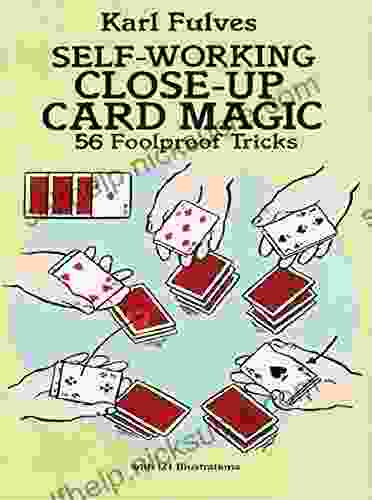
 Bryan Gray
Bryan GrayThe Unbelievable World of Self-Working Close Up Card...
Imagine having...
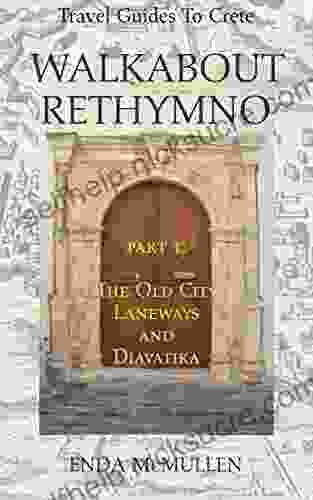
 Junot Díaz
Junot DíazUnveiling the Enchanting Old City Laneways and Diavatika:...
Crete, the largest of...

 Jamison Cox
Jamison CoxA Year in the American Wild: Recreating a Feast from...
For one year, I lived off...

 Holden Bell
Holden BellArchaeology of Early American Life: An Exploration of...
The archaeology...

 Rodney Parker
Rodney ParkerRegain Your Fertility By Reversing Insulin Resistance,...
If you're struggling to conceive, you may be...
5 out of 5
| Language | : | English |
| File size | : | 3969 KB |
| Text-to-Speech | : | Enabled |
| Screen Reader | : | Supported |
| Enhanced typesetting | : | Enabled |
| Word Wise | : | Enabled |
| Print length | : | 234 pages |


